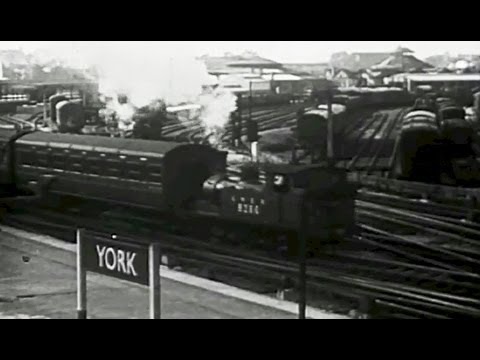more at
Pre-TV England: “Typical events in the daily life of an English urban family just after World War II.”
NEW VERSION with improved video & sound:
Originally a public domain film from the Prelinger Archive, slightly cropped to remove uneven edges, with the aspect ratio corrected, and mild video noise reduction applied.
The soundtrack was also processed with volume normalization, noise reduction, clipping reduction, and/or equalization (the resulting sound, though not perfect, is far less noisy than the original).
Wikipedia license:
England… is a country that is part of the United Kingdom. It shares land borders with Scotland to the north and Wales to the west. The Irish Sea lies north west of England, whilst the Celtic Sea lies to the south west. The North Sea to the east and the English Channel to the south separate it from continental Europe. Most of England comprises the central and southern part of the island of Great Britain which lies in the North Atlantic. The country also includes over 100 smaller islands such as the Isles of Scilly, and the Isle of Wight.
The area now called England was first inhabited by modern humans during the Upper Palaeolithic period, but it takes its name from the Angles, one of the Germanic tribes who settled during the 5th and 6th centuries. England became a unified state in 927 AD, and since the Age of Discovery, which began during the 15th century, has had a significant cultural and legal impact on the wider world. The English language, the Anglican Church, and English law — the basis for the common law legal systems of many other countries around the world — developed in England, and the country’s parliamentary system of government has been widely adopted by other nations. The Industrial Revolution began in 18th-century England, transforming its society into the world’s first industrialised nation.
England’s terrain mostly comprises low hills and plains, especially in central and southern England. However, there are uplands in the north (for example, the mountainous Lake District, Pennines, and Yorkshire Dales) and in the south west (for example, Dartmoor and the Cotswolds). The former capital of England was Winchester until replaced by London in 1066. Today London is the largest metropolitan area in the United Kingdom and the largest urban zone in the European Union by most measures. England’s population is about 53 million, around 84% of the population of the United Kingdom, and is largely concentrated in and around London, the South East, and conurbations in the Midlands, the North West, the North East and Yorkshire, which each developed as major industrial regions during the 19th century. The Kingdom of England — which after 1284 included Wales — was a sovereign state until 1 May 1707, when the Acts of Union put into effect the terms agreed in the Treaty of Union the previous year, resulting in a political union with the Kingdom of Scotland to create the new Kingdom of Great Britain. In 1801, Great Britain was united with the Kingdom of Ireland through another Act of Union to become the United Kingdom of Great Britain and Ireland. In 1922, the Irish Free State was established as a separate dominion, but the Royal and Parliamentary Titles Act 1927 reincorporated into the kingdom six Irish counties to officially create the current United Kingdom of Great Britain and Northern Ireland…
London became the largest and most populous metropolitan area in the world during the Victorian era, and trade within the British Empire—as well as the standing of the British military and navy—was prestigious…
…Residential patterns were altered in England by private motoring, and by the creation of the National Health Service (NHS) in 1948. The UK’s NHS provided publicly funded health care to all UK permanent residents free at the point of need, being paid for from general taxation. Combined, these changes prompted the reform of local government in England in the mid-20th century…
Since the 20th century there has been significant population movement to England, mostly from other parts of the British Isles, but also from the Commonwealth, particularly the Indian subcontinent… Since the late 20th century the administration of the United Kingdom has moved towards devolved governance in Scotland, Wales and Northern Ireland. England and Wales continues to exist as a jurisdiction within the United Kingdom. Devolution has stimulated a greater emphasis on a more English-specific identity and patriotism. There is no devolved English government, but an attempt to create a similar system on a sub-regional basis was rejected by referendum…

